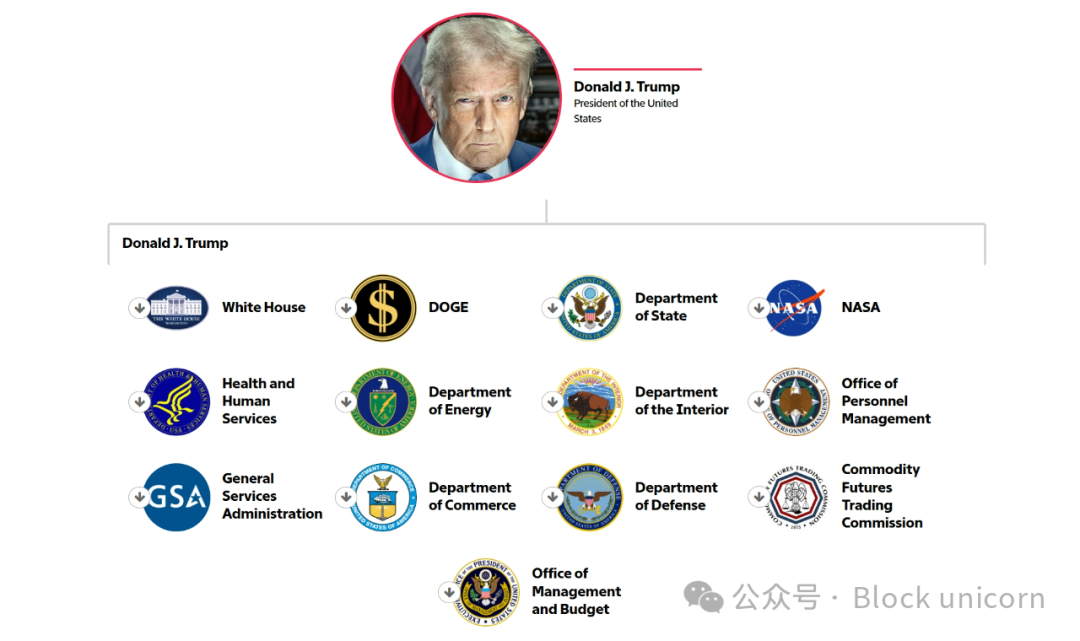Author: Julia Black
Translation by: Block unicorn

Introduction:
- Several tech appointees from the Trump administration previously served in past presidential administrations, including Michael Kratsios (during Donald Trump's first term), Abner Sutton (during Donald Trump's first term), and Jim O'Neill (during George W. Bush's era).
- Elon Musk's government efficiency department recruited former employees from Musk's companies, some of whom are just 19 years old.
- Many tech appointees and advisors in the Trump administration were significant donors to his campaign, including Musk, Marc Andreessen, Jacob Helberg, and David Sacks.
Silicon Valley is "invading" Washington
So far, Silicon Valley's "invasion" of Washington has largely focused on how a group of young tech experts from Elon Musk and his companies are thoroughly investigating the federal government for waste. However, employees from other Silicon Valley companies are also playing important roles in the Trump administration.
In fact, you could almost call this administration the "A16Z government." Our organizational chart shows over 24 top tech experts in Trump's team, including four current or former A16Z partners who hold formal or informal roles in the Trump administration. This includes co-founder Marc Andreessen, who is an advisor to the government efficiency department led by Musk, and Scott Cooper, who serves as the director of the Office of Personnel Management.
Trump plans to nominate A16Z's head of crypto policy, Brian Quintenz, to lead the Commodity Futures Trading Commission, Quintenz posted on X on Wednesday morning. Meanwhile, the company's Jamie Sullivan is also assisting the government efficiency department, while former A16Z partner Sriram Krishnan serves as an AI advisor to the White House. According to several insiders, A16Z's influence in the government is so deep that members of its talent team are helping recruit government staff.
The company's involvement highlights the rapidly increasing influence of high tech on the U.S. government over the past month. This is particularly evident compared to Trump's first term, during which he had public conflicts with the tech industry over issues like immigration and content moderation.
However, as he campaigns for re-election, Trump has begun to indicate that his interests are increasingly aligned with Silicon Valley—such as funding large AI projects, easing regulations on the crypto market, overhauling defense procurement, and reducing red tape for biotech entrepreneurs.
At the forefront are Musk and his government efficiency department employees, who are shuttling between federal agencies and their tech systems, conducting comprehensive audits and recommending layoffs. Musk's aides—including Steve Davis, Jane Barahadiya, and Amanda Skelton—have stepped away from their daily work at The Boring Company and xAI to assist the government efficiency department.
Of course, running the country at a startup pace means Musk and his team are ignoring issues related to conflicts of interest, handling sensitive private data, and even the legality of their actions. On Tuesday, Musk appeared with Trump in the Oval Office as the president signed an executive order solidifying the responsibilities of the government efficiency department.
When asked by reporters about potential conflicts arising from his numerous business interests, Musk did not answer the question but responded, "All of our actions are as transparent as possible. In fact, I don't know of any organization that is more transparent than the government efficiency department."
There are signs that more people from the tech industry will continue to join the federal government. Last week, the Office of Personnel Management released a memo announcing that senior executive service and chief information officer positions would be reclassified from career positions to political appointments. This change could open the door for non-traditional candidates from the tech and business sectors to these positions.
A16Z is not the only investment firm leaving its mark on the government. 8VC, founded by Palantir co-founder Joe Lonsdale, is drafting policy memos, such as a recent healthcare report, which seem to be becoming blueprints for the new administration. Meanwhile, a series of investment firms by Peter Thiel have become "finishing schools" for senior officials, including Vice President J.D. Vance.
There are already signs that some tech and business figures may not stay long in government positions. Entrepreneurs like Vivek Ramaswamy, as well as Loom co-founders Shahid Khan and Vinay Hiremath, have left the government efficiency department just weeks after joining.
Currently, some tech experts have expressed their excitement at suddenly wielding government power. Early Roblox employee John Shedletsky recently summarized this sentiment on X: "Silicon Valley built the modern world. Why can't we take control of it?"
免责声明:本文章仅代表作者个人观点,不代表本平台的立场和观点。本文章仅供信息分享,不构成对任何人的任何投资建议。用户与作者之间的任何争议,与本平台无关。如网页中刊载的文章或图片涉及侵权,请提供相关的权利证明和身份证明发送邮件到support@aicoin.com,本平台相关工作人员将会进行核查。




